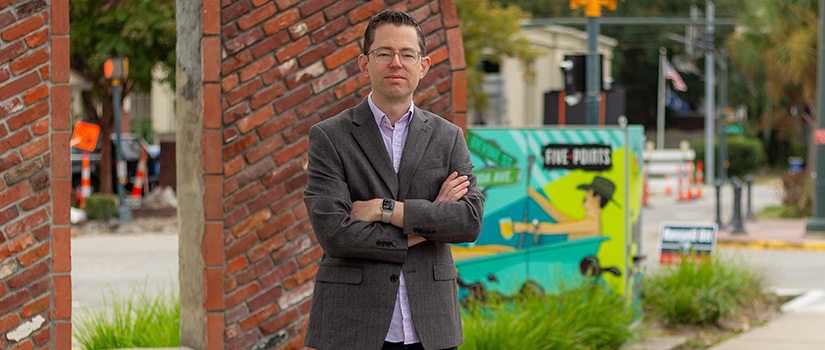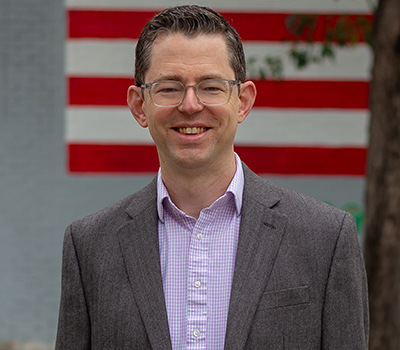The neighborhood someone lives in can impact a person’s health, education, employment and other life experiences. But understanding that impact in a way that can improve neighborhoods is not so easy. That’s why Brian Levy studies neighborhoods and inequality as a sociologist.
Levy recently joined USC from George Mason University’s sociology department. He has worked in anti-poverty policy for the U.S. Department of Health and Human Services, and his time there inspired his passion for social science research and public policy. He completed a Ph.D. in sociology from UNC-Chapel Hill and a postdoctoral fellowship at Harvard University.
In the classroom, he helps students to gain a healthy appreciation for the difficulties and uncertainties inherent in social science research. Drawing on the diverse perspectives and insights of students, he helps them to answer the important questions of his field.
Where do you call home? What brought you to USC? Tell us about your academic and professional journey so far.
Columbia is home now! My family and I have quickly grown to love the university and city. I came to USC because of the exciting work being done both in the Department of Sociology and the university more broadly, which aligns in several ways with my own interests. I also was excited to join a growing and vibrant state flagship university.
What first drew you to your main area of expertise? What do you love about it?
My research investigates how neighborhoods and segregation affect inequality in the United States. Segregation by both race and class was quite visible in many of the places and institutions where I spent my childhood. The initial scientific spark was probably Hurricane Katrina because I have a lot of family in New Orleans.
I enjoy studying neighborhoods because they are a challenging scientific puzzle. Nearly all of us think they matter at least somewhat, but it is difficult to empirically identify precisely how much and why. I enjoy thinking about new ways to address these types of questions while also being troubled by how much neighborhoods matter and how unequal they can be.
How would you describe your research to someone who hasn't studied this field before?
I analyze how the types of neighborhood(s) in which people reside long-term affect their educational, socioeconomic and health outcomes. I also investigate whether neighborhoods matter more for some types of people than others, as well as whether there are key periods in one’s life when neighborhoods are especially important.
I also think about how neighborhoods are—or are not—connected to each other. This work shows that segregation is even more important than previously thought for outcomes like public health and violence, and mobility-based isolation plays a large role in this.
How are you finding the USC community so far? What is something new you’ve discovered about life as a Gamecock or here in the Columbia area?
USC and Columbia are terrific. My family has already found so many spots and activities that we really enjoy: the Soda City market, downtown library, All Good Books, local coffee shops, walking trails along the rivers, and more. We also became Gamecock fans before moving as my daughter and I enjoyed watching the USC women’s basketball team win during the opening weekend of March Madness while house hunting last March. We are excited to attend other sports, arts and community events in the years ahead.
Tell us a bit more about you! What do you enjoy doing in your free time?
We have two young kids at home, so free time has taken on a new meaning the past few years. Lots more park trips and short walks as opposed to longer treks. Generally, though, I enjoy being outdoors, traveling to new places, reading, cooking, and a good cup of coffee.

